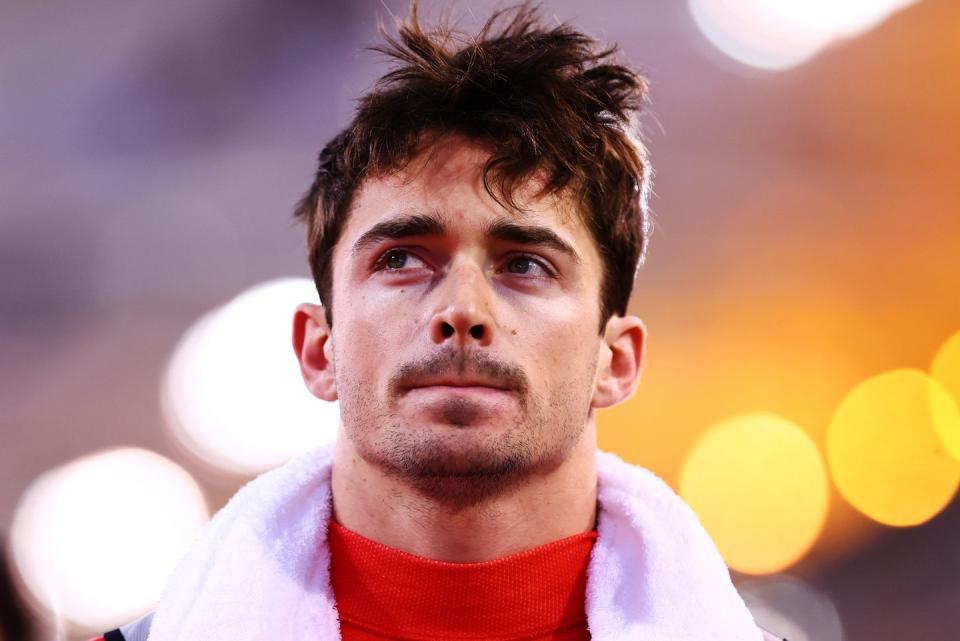Why Ferrari's Charles Leclerc Is Taking a 10-place F1 Grid Penalty for Saudi Arabian Grand Prix

Ferrari encountered reliability issues in Bahrain, where Charles Leclerc finished 19th.
As hard as it is to believe, Ferrari is using the third different Control Electronics unit on its car this week, triggering a 10-place grid penalty.
The penalty will be assessed following Saturday's qualifying in Saudi Arabia.
Formula 1 is heading into only its second race of a record-breaking 23-event 2023 season but already Ferrari driver Charles Leclerc is already dealing with a grid penalty.
Ferrari encountered reliability issues in Bahrain when it fired up Leclerc’s SF-23 prior to the race, forcing the team to install a second Energy Store and Control Electronics on the car. They are two of the six components that comprise the power unit and each driver is limited on the number of each parts they are permitted to use per season.
Leclerc then suffered a failure during the race, forcing him to retire from third place, and Ferrari’s post-race analysis determined that he must take on a new Control Electronics for this weekend’s Saudi Arabian Grand Prix. As only two CEs are allowed per driver per season Leclerc taking on a third CE means he will incur a 10-place grid penalty from wherever he qualifies on Saturday.

The issue was a failure that Ferrari has never experienced and the team expressed confidence that the fault has now been remedied. It is nonetheless another setback for Leclerc after a deeply frustrating start to the 2023 season.
Ferrari faced a chasm to Red Bull in race pace in Bahrain while Leclerc’s premature exit means he is already 25 points behind Verstappen. Taking on fresh power unit components so early in the year also raises the likelihood of further grid penalties later in the season. It is a particular blow given how engine reliability was a key area of work for Ferrari during the winter break on account of its 2022 failures—a weakness it was confident preseason that it had addressed.
“Well, it is the way it is,” said a pragmatic Leclerc. “It’s the beginning of the season. Of course, it’s not the ideal start that I wish I had at the beginning, starting in Bahrain, but what can I do about it?
“Now we need to focus on what’s ahead, what we can do to be a better team, to be better. And yeah, this weekend, we obviously started on the back foot, but our target is to try and do something special. I like this challenge of starting a little bit more on the back foot and trying to do something special, and come back at the front as quickly as possible.”
Leclerc emphasized that “it’s only the first race of the season and we’ve still got many races to go. We still need to be fighting like crazy to be back at the top and keep pushing. I still believe in it. Of course, we all still need to believe in it.”
Leclerc visited Ferrari’s factory at Maranello between Bahrain and Saudi Arabia to help motivate the large workforce though rejected speculation that he had requested a special meeting with Ferrari chairman John Elkann.
“There have been loads of rumors around the team, which, for once, 90% of them were completely unfounded,” Leclerc. “So yeah, I don’t know from where it is coming from, and to be honest, I don’t want to spend even any energy on trying to find from where it’s coming from. We just need to be on it and focused our ourselves.”
Leclerc’s team-mate, Carlos Sainz, was fourth in Bahrain—having been beaten to the podium by Aston Martin’s Fernando Alonso—and also dismissed speculation of a fraught atmosphere at Ferrari.
“It (the atmosphere) is a lot better than what the news makes it sound like,” said Sainz. “If you look back at this last weekend and how many rumors there have been around, it seems like the place is not in a great moment, but I can tell you it is so clear to us what we need to improve, how we need to do it, what are the short, medium and long term targets, that I’m actually very surprised at how some people back at home have been trying to destabilize the team.

“Some call it a crisis but we’ve only done one race, it’s impossible to judge a team’s performance after just one race, and we are the first ones not happy with how this first race went, we are the most worried about it and we are the most affected by it and we’re going to try as much as possible to improve.”
World Champion Verstappen was absent from Thursday’s media duties due to a stomach bug; he and Red Bull received dispensation from the FIA not to be present at the track and he will arrive in Jeddah in time for Friday practice.

 Yahoo Autos
Yahoo Autos 